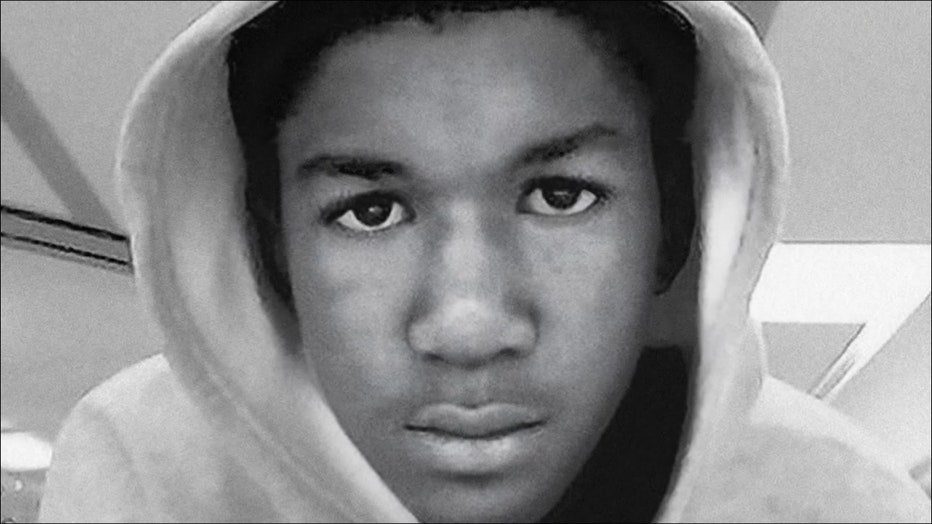Trayvon Martin remembered 10 years after his death
SANFORD, Fla. - Trayvon Martin’s final night began with a convenience store run and ended in confrontation with a neighborhood watch volunteer, leaving the 17-year-old dead on the street.
Feb. 26 marks ten years since the killing which sparked nationwide protests, in partisanship, in racial reckoning and reactionary response, in social justice and social media.
"We’re the Trayvon Martin generation, we are the people who were moved into action because of it," said Nailah Summers-Polite, co-director of Dream Defenders, an organization founded in Florida after Martin’s death.
Martin was visiting his father in a gated community in Sanford, Florida, a suburb of Orlando, on Feb. 26, 2012. On the way back from the store, he was eyed by George Zimmerman, then 28, a member of the community’s neighborhood watch.
The initial police report said Zimmerman called authorities to report a suspicious person. Then, armed with a gun, Zimmerman got out of his car.
RELATED: Judge tosses George Zimmerman’s lawsuit against Trayvon Martin's parents
In the confrontation that followed, Zimmerman would tell authorities, Martin attacked him, forcing him to use his gun to save himself. Zimmerman was allowed to go free.
Martin’s parents, Sybrina Fulton and Tracy Martin, questioned whether their son had been profiled as "suspicious" merely because he was Black. Zimmerman’s family was adamant that their son and brother, who identified as Hispanic, was not racist.
MORE NEWS: Ahmaud Arbery: Jury finds men who killed Black jogger guilty of hate crimes
As media attention picked up in early March, others joined in.
For many Black people, the idea that Trayvon had been profiled because of his race hit a nerve. In his death they saw their own vulnerabilities.

"It felt like, `Oh, wow, I can’t walk down the street, even in the realm of my everyday life, normal happenings, that could have easily been me,’" said Jonel Edwards, another co-director of Dream Defenders.
It was especially jarring in 2012, when Barack Obama was the country’s first Black president. His election had some insisting that America had turned a real corner in its troubled racial story; even many skeptics thought there had been progress.
But the United States "had elected a Black president and had a Black attorney general, and they are still killing us and not even arresting the killer ... we all saw our kids were still vulnerable," said the Rev. Al Sharpton.
MORE NEWS: Derek Chauvin verdict: Guilty on all counts in George Floyd's death
For years, police killings of Black people had caused outrage. But Zimmerman "was not law enforcement," said Jenner Furst, co-director of the documentary, "Rest in Power: The Trayvon Martin Story."
"This person did not have a badge," he said. "This person had not been trained how to operate a firearm in the case of an emergency and not been trained in conflict management, had no skills for determining who is and who isn’t the risk."
Many looking to speak out turned to social media, which had started showing its potential as a platform for protest.
A petition on Change.org calling for Zimmerman’s prosecution garnered celebrity support, with more than 2.2 million people signing.
While Zimmerman set up a site to seek donations to help his defense, his online detractors were many. Social media brought together multitudes for protests like the Million Hoodie March, as well as celebrities and everyday folk who posted images of themselves wearing hoodies with the hashtag, "I am Trayvon Martin."
Among them: LeBron James, then playing with the Miami Heat, who posted an image of him and his teammates wearing hoodies, their heads bowed.
Obama framed it as no other president could.
"I can only imagine what these parents are going through. And when I think about this boy, I think about my own kids," Obama said.
"If I had a son, he’d look like Trayvon."
Six weeks after the shooting, Zimmerman was charged with second-degree murder; he was acquitted in 2013. But the ferment unleashed by Trayvon Martin’s death continued.
The verdict inspired a Facebook post written by Alicia Garza, a hashtag created by Patrisse Cullors and a social media strategy spearheaded by Ayo Tometi -- and the result was Black Lives Matter, a movement to combat racism and racial violence against Black communities.
And many of the same demonstrators incensed by Martin’s killing took to the streets to protest the death of Michael Brown, 18 and unarmed, killed by a police officer in Ferguson, Missouri, in August 2014, just weeks after Eric Garner, also unarmed, was killed by police in New York City.
"The moment of Trayvon Martin really opened our eyes," said Edwards, of Dream Defenders.
Then the 2020 death of George Floyd, killed by Minneapolis police, brought out a wide range of people around the country and the world.
But that public anger also inspired a reaction. There have been those who took exception to Obama’s words of affinity to Martin, and saw the protests as anti-police chaos and disorder.
Others acknowledge that Martin’s death and its aftermath changed the country, but question whether the change was even remotely sufficient.
Sharpton, while disappointed that there has not been more federal legislation put into place, said a "cultural change" has happened.
He pointed to the case of Ahmaud Arbery, the 25-year-old Black man chased and killed in 2020 by three white men. The shooter in that case also claimed self-defense, but an almost entirely white jury found them all guilty.
"I think Trayvon shifted the culture where people started looking at things a little differently and nothing to me personifies that more than Arbery," Sharpton said. "These two young men, I think, are the two pillars where we are on race."
Click here for the latest Central Florida news, Florida stories and local headlines.

